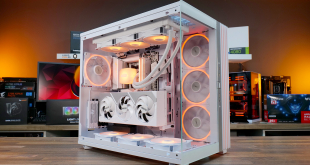
Today we are looking at the latest high end 24 inch monitor from Asus, the PA248Q. This monitor features a pre-calibrated LED backlit IPS panel with 1920×1200 resolution. The PA248Q ProArt display is said to guarantee industry leading colour accuracy and is shipped with a minimal colour differential at ∆E < 5. It is also the world's first monitor to be sold with four USB 3.0 ports.
The Asus ProArt monitors are designed primarily to render class leading colour accuracy, targeting the professional sector. Asus have incorporated technologies such as QuickFit, Splendid and a 5 way navigation key to enhance productivity.
To suit the more demanding target audience, the stand has full control over tilt, swivel, pivot and height adjustments.
Asus also have included the ‘QuickFit' virtual scale function which allows users to preview photos and documents on screen in their actual sizes prior to printing. It can activated via a hotkey on monitor and used as a guide to accurately view and edit photos.
Display Specifications:
Panel Size: Wide Screen 24.1″ (61.13cm) 16:10
Color Saturation : 72% (NTSC)
Panel Type : IPS
True Resolution : 1920×1200
Pixel Pitch : 0.270mm
Brightness(Max) : 300 cd/㎡
ASUS Smart Contrast Ratio (ASCR) : 80000000:1
Viewing Angle (CR≧10) : 178°(H)/178°(V)
Response Time : 6ms (Gray to Gray)
Display Colors : 16.7M
LCD ZBD Warranty : Yes
 KitGuru KitGuru.net – Tech News | Hardware News | Hardware Reviews | IOS | Mobile | Gaming | Graphics Cards
KitGuru KitGuru.net – Tech News | Hardware News | Hardware Reviews | IOS | Mobile | Gaming | Graphics Cards




brilliant review, you made me want to but it. until I looked at my bank balance. perhaps next month.
I like the thicker design too, many of them now seem to focus on silly gimmicks like lighting.
Thats such a nice looking monitor. I can’t believe how much the price has dropped.
Although im saving for the ARIA 27 inch deal for £500, its only £200 more than this with much higher resolution. it will be all gone probably by the time i can afford it.
This is my next monitor,definetely.
Hello, can you please talk about how is this PA248Q compared to the PA246Q you reviewed last year?? Thanks
246Q is way better if you look for color accuracity and etcs. because:
PA26Q uses 10bit P-IPS + 12bit LUT instead of the 8bit e-IPS + 8bit LUT used in 28Q. Also 26Q uses WCG-CCFF which is also better to the cheap WLED.
WLED = White LED – cheap. It’s not RGB-LED
WCG-CCFL = Wide Color Gamut Cold Cathode Fluriscent Lamp = WIN
WLED is only better if we speak about power comsumption and sizes.
Also I can’t see CARD reader on the monitor, which is very important for the users that is aimed for this monitor. USB 3 is … anyways.
If you see the prices 28Q is cheaper a lot than 26Q and this is normal.
So for the end – 26Q outperforms the new 28Q which is orientated for mainstream designer/user.
Does anyone know how compatible this screen is with gaming systems like PS3 and Xbox360?
The resolution is 1900×1200, but, does this monitor have a scaler that readily converts 720p or 1080p up to 1900×1200?
If so, does it generate a noticeable amount of input lag, or create black bars?
Thanks for the review!
Ok, based on your review, I just purchased one from BestBuy using the 10% off on-line coupon. If it’s as good as you make it out to be at this price, I likely won’t have too much to complain about.
The matt screen is what would stop me from buying this monitor. I really hate AG coating on monitor panels, even if it is considered light. I am looking for a 16:10 IPS, PLS, (or similar), monitor…..with a glossy, semi-glossy, or anti-reflective screen. The choices are very limited right now, but I am hoping that manufactures will start listening to consumers….and start giving us that choice!
I wonder if the Black Definition is measured with dynamic contrast enabled? If that is the case, i.e. the black definition is measured with backlight turned OFF, the results are useless.
BTW, I hate it how low-end monitors are marketed with ridiculous dynamic contrast values such as 80,000,000:1 . Those numbers have nothing to do with reality. They are invented by the advertising department by just picking a number that is bigger than what competitors have advertised.